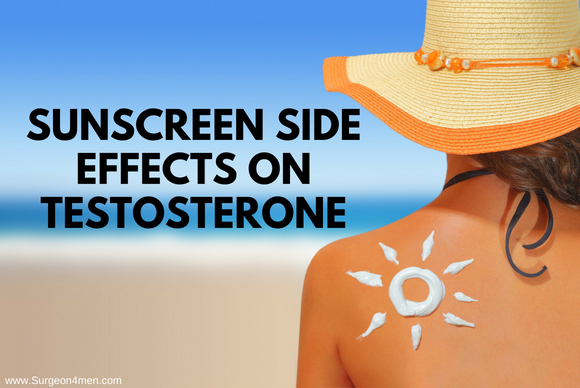Sunscreen Side Effects On Testosterone
Have you ever wondered what our forefather spent a much healthier life than us? They were much stronger, active and healthier as compared to people of the current era. With the passage of time, our lives have been captivated by latest technology that has resulted in hazardous repercussions.
Mild modification in our lifestyle can make us further vulnerable to develop certain diseases and infections. For example, we avoid sun exposure. Even if it is necessary to go out in the sun, we use lots of sunblock and other lotions on exposed body parts to avoid rays of the sun. This is probably because people nowadays believe that going out in sun without applying sunscreen can damage our skin and increases the chances of developing certain skin cancers. But our ancestors spent much more time than us in the sun without any sunscreen protection but there was a considerably lower number of skin cancer patients than versus now.
Effects of using sunscreen:
According to a new survey, exposure to sun on daily basis reduces the risk of developing skin cancer (melanoma). The sunblock and sunscreen combination create a harmful mixture of chemicals that are too dangerous for skin and can also interrupt the normal functioning of your endocrine system. These chemicals also exert several deleterious effects on the serum levels of testosterone.
How sunscreens are dangerous for testosterone levels?
According to a research the sunscreen lotions mainly comprises of following chemicals.
- Benzophenones- BP 1, BP 2, BP 3
- Parabens (methyl, propyl etc)
- 4-Methylbenzylidene camphor
- Octyl dimethyl PABA.
- Octyl methoxycinamate.
- Homosolate
These chemicals are considered to be harmful for the human body and have following effects on the overall health:
- Benzophenones: (BP 1, BP 2, BP 3)
These compounds are formed from 2 hydroxybenzophenone. They usually found in cosmetics and other personal care products. According to an in-vitro diagnostic study, the BP1 restrict androgen receptors activity and reduces testosterone levels. Another in vitro diagnostic research on humans, states that BP 2 reduces the level of testosterone in testicular cells and also has an adverse impact on the serum thyroid levels. Another analysis conducted by Dr. Peter Dingle, suggested that most sunscreens comprises of 3 main ingredients i.e. benzephone 3, 4 MBC and Octyl methoxycinnamate and its continuous application results in reduction in the serum testosterone levels and higher estradiol levels in males.
Another fact about Benzophenones which is even worse is that these chemicals can penetrate into your skin really fast via bilayer of phospholipids in the skin; thereby entering directly into the bloodstream.
- Parabens:
Parabens are extensively used preservatives that are usually found in the shampoos, soaps, sunscreen and other cosmetic and pharmaceutical products in order to reduce the growth of bacteria and microbes. Although these compounds have a fairly low estrogenic response in the body; yet these are still considered xenoestrogens (a type of hormone that acts as estrogens inside the human body due to receptor activity) and cause issues in the endocrine system. Needless to say that continuous usage results in the buildup of these compounds in the fatty tissues.
- 4-Methylbenzylidene camphor
Many studies suggest that 4-Methylbenzylidene camphor is also a xenoestrogen and increase estrogen levels by activating estrogen receptor. Laboratory tests suggests that these compounds also increase TSH level and decrease T3 and T4 which result in hypothyroidism. Reduction in thyroid gland activity results in the reduction of testosterone levels in human body.
- Octyl dimethyl PABA:
Octyl dimethyl PABA also has weak estrogenic characteristics. It is also a well-known UV blocker.
- Octyl methoxycinnamate:
It is an Ultraviolet filter. There was an experiment conducted back in 2000 in which it was discovered that Octyl methoxycinnamate may acts as a toxin when tested on rats. It is noteworthy that the dosage used in the experiment was equivalent to the doses which are used in the sunscreens. Another study suggested that this compound is not that efficiently absorbed by the human body. Nevertheless, it is customary to limit the exposure to this compound.
- Homosalate
It is also a UV filter. According to a research conducted on cultured human cells, it was discovered that Homosalate usage results in the disturbance of endocrine system. The sunlight further decomposes the chemical into more toxin byproduct. It is exhibited to be an antiandrogenic agent by an in-vitro study.
Conclusion:
It is strongly recommended to avoid using sunscreen due to potential adverse effects on the functioning of the endocrine system.

